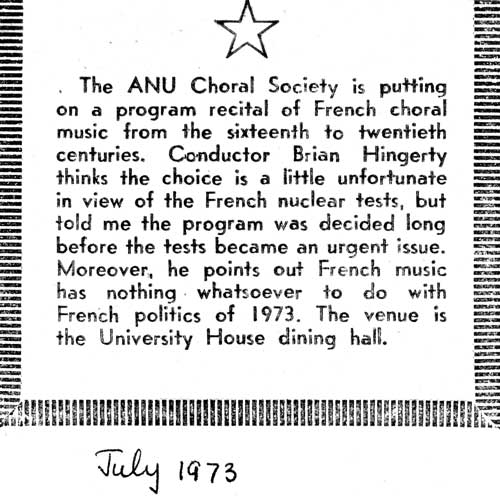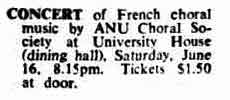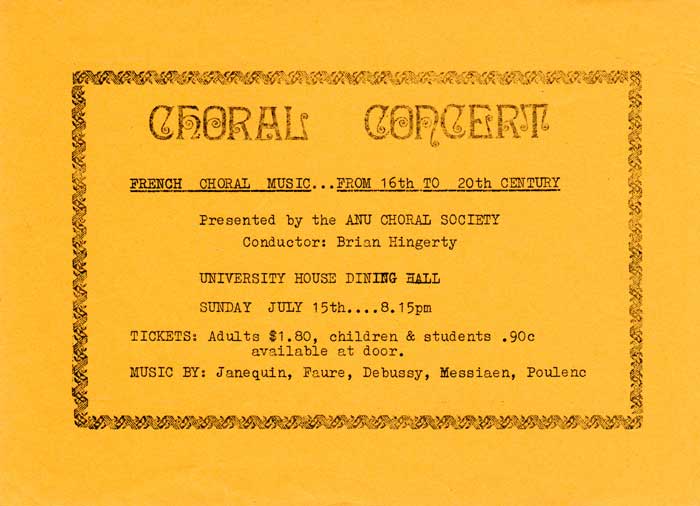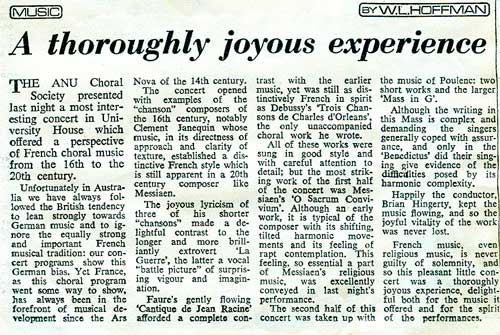

SCUNA history » Concerts » 1973 - 2nd term - Other information including review
On this page: From Erato | Advertisement | Article | Flier | Review
"1973 was something of a mixed year for the society. On the credit side there was the appearance of a new SCUNA chamber group and some very good performances; on the debit side, we had a large fall-off in numbers during first term, and a mix-up over conductors later in the year. The problems in first term stemmed probably from the difficulty of the music, which was enough to discourage all but the most enthusiastic recruit. Poulenc's Mass in G is regarded as the most difficult music ever attempted by SCUNA - an excellent work, but very testing. Supporting features consisted of other French music, by Janequin (his sound-effects work La Guerre), Passereau, Costeley, Debussy and Messiaen. The concert had to be postponed until June when two performances were given. The audience size was disappointing."
Source: anonymous historical article in Erato 19. See AICSA's Erato Archive.

CONCERT of French choral music by ANU Choral Society at University House (dining hall), Saturday, June 16, 8.15pm. Tickets $1.50 at door.
Source: Advertising. (1973, June 9). The Canberra Times (ACT : 1926 - 1995), p. 20. Retrieved June 1, 2013, from Trove: http://nla.gov.au/nla.news-article110713815

The ANU Choral Society is putting on a program recital of French choral music from the sixteenth to twentieth centuries. Conductor Brian Hingerty thinks the choice is a little unfortunate in view of the French nuclear tests, but told me the program was decided long before the tests became an urgent issue. Moreover, he points out French music has nothing whatsoever to do with French politics of 1973. The venue is the University House dining hall.
[Handwritten: July 1973]
Source: Brian Hingerty

CHORAL CONCERT
FRENCH CHORAL MUSIC...FROM 16th TO 20th CENTURY
Presented by the ANU CHORAL SOCIETY
Conductor: Brian Hingerty
UNIVERSITY HOUSE DINING HALL
SUNDAY JULY 15th....8.15pm
TICKETS: Adults $1.80, children & students .90c available at door.
MUSIC BY: Janequin, Faure, Debussy, Messiaen, Poulenc
[Original size: A5]
Source: Brian Hingerty

The ANU Choral Society presented last night a most interesting concert in University House which offered a perspective of French choral music from the 16th to the 20th century.
Unfortunately in Australia we have always followed the British tendency to lean strongly towards German music and to ignore the equally strong and important French musical tradition: our concert programs show this German bias. Yet France, as this choral program went some way to show, has always been in the forefront of musical development since the Ars Nova of the 14th century.
The concert opened with examples of the "chanson" composers of the 16th century, notably Clement Janequin whose music, in its directness of approach and clarity of texture, established a distinctive French style which is still apparent in a 20th century composer like Messiaen.
The joyous lyricism of three of his shorter "chansons" made a delightful contrast to the longer and more brilliantly extrovert La Guerre, the latter a vocal "battle picture" of surprising vigour and imagination.
Faure's gently flowing Cantique de Jean Racine afforded a complete contrast with the earlier music, yet was still as distinctively French in spirit as Debussy's Trois Chansons de Charles d'Orleans, the only unaccompanied choral work he wrote.
All of these works were sung in good style and with careful attention to detail; but the most striking work of the first half of the concert was Messiaen's 0 Sacrum Convivium. Although an early work, it is typical of the composer with its shifting, tilted harmonic movements and its feeling of rapt contemplation. This feeling, so essential a part of Mcssiaen's religious music, was excellently conveyed in last night's performance.
The second half of this concert was taken up with the music of Poulenc: two short works and the larger Mass in G.
Although the writing in this Mass is complex and demanding the singers generally coped with assurance, and only in the 'Benedictus' did their singing give evidence of the difficulties posed by its harmonic complexity.
Happily the conductor, Brian Hingerty, kept the music flowing, and so the joyful vitality of the work was never lost.
French music, even religious music, is never guilty of solemnity, and so this pleasant little concert was a thoroughly joyous experience, delightful both for the music it offered and for the spirit of the performances.
Source: scan provided by Deborah Martin, from the Canberra Times [? of 16 or 17 July 1973]